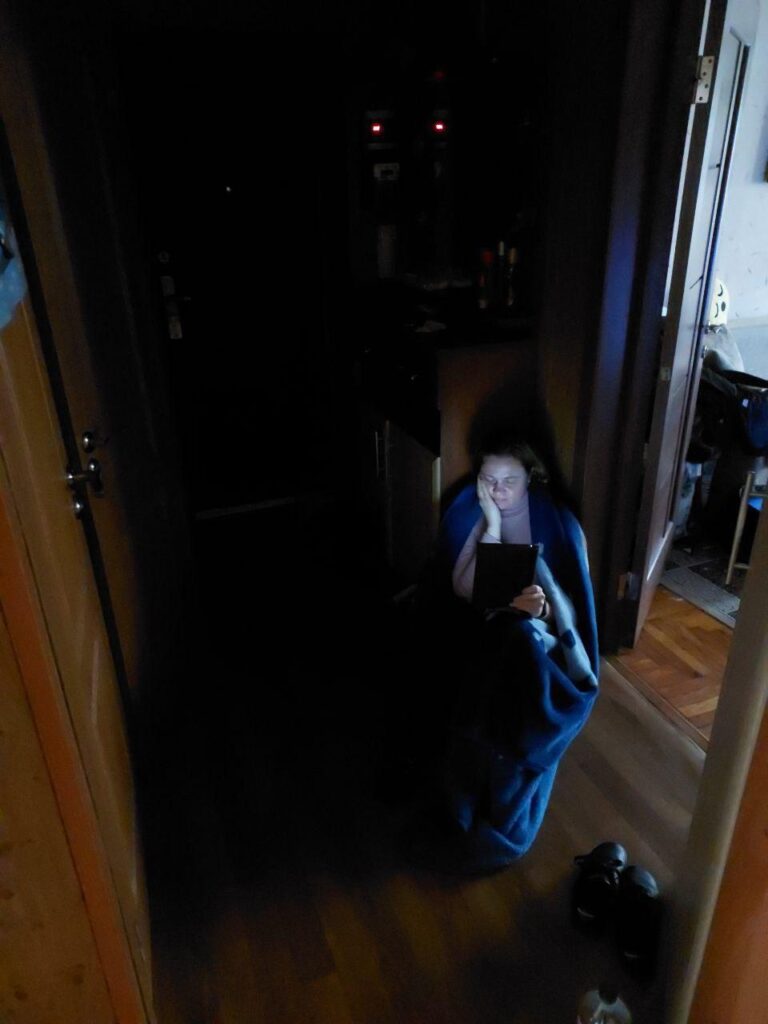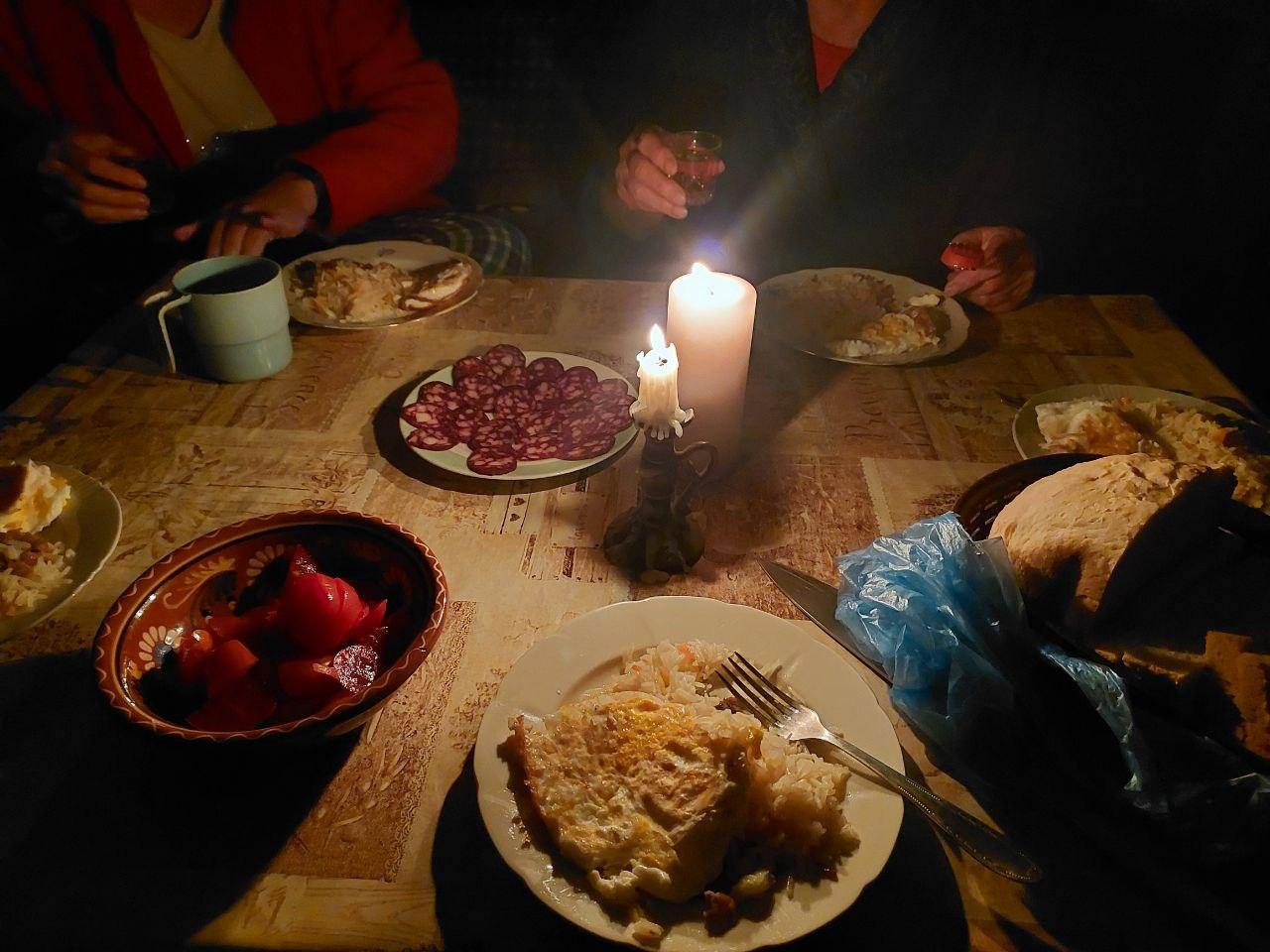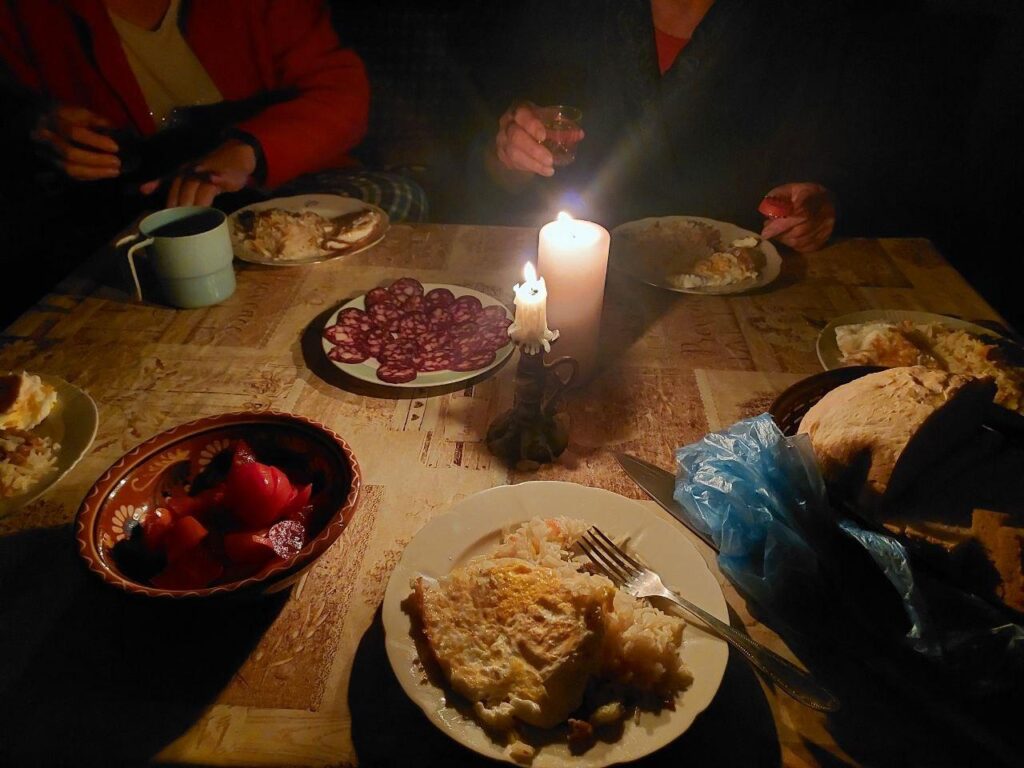My name is Oleksandr. I’m almost 20. My birthday is on the 13th of March, so it’s pretty soon.
To my mom, I’m Sasha—a term of endearment.
To my friends, I’m Sanya. It means Sasha too, but cooler.
And my girlfriend? She calls me both, depending on her mood.
I live in Zaporizhzhia. It’s a great city in southeast Ukraine, 230 kilometres from Donetsk. It’s my home. It gave life to brave Ukrainian Cossacks who fought and died for their freedom. Freedom from feudal lords, Russian boyars and Ottoman raiders. I used to study them a lot in school and they gave me a good piece of advice: freedom isn’t something you should give up easily.
I’m quite active—but it depends on the season. If it’s summer, I go swimming, ride bikes, travel and, of course, do what every teenager loves to do: party! And this is what I’m doing now: waiting for summer.
Just not in the way I thought I would.
It’s date night and I am watching a Disney cartoon with my girlfriend Lisa. We’re watching The Owl House. I’m the one who suggested it. Eventually, the movie’s over, we’ve run out of snacks and we just sit there, on my bed, talking about our plans for the future. “Let’s go to McDonald’s this week,” she says. “We haven’t eaten anything unhealthy in years. Oof, I really want their french fries.”
“We can take a stroll through the city centre beforehand,” I suggest. The thought brings a smile to her face. Our goodbyes are simple. I walk her to the apartment complex where she lives with her parents and younger brother. Right before walking in, she hugs me.
“See you tomorrow?”
“See you tomorrow.”
I kiss her, wave my hand and walk down the street, back to my flat. I change my clothes, floss my teeth and lay down on my bed. My only thought is about how to get some money quickly to buy burgers. It’s the only thing I care about. And with that, I call it a day and set my alarm for 8 am.
Only to be woken up earlier.
My mother bursts into my room, turns on the light and with a terrified voice says: “Get up, Sasha. The war has started.”
I immediately doubt her words. But then, I hear the explosions myself. I send Lisa a voice message. “Lisa, do not go to work today. Grab all your documents in a backpack, and be ready to evacuate!” I’m grabbing my own backpack as I talk, filling it up.
The windows of the neighbouring flats turn yellow one by one. People are waking up to the sound of war, turning their lights and TVs on. My hands shake, my forehead is sweating and my teeth tremble. I need to get hold of myself. But no matter how much I try, it’s hopeless.
We quickly receive a message from the university council. As a safety measure, all classes will be taught online. So I’m stuck at home, watching the war unfold around me, and online. All of our major cities get attacked by missiles. The videos and their impact flood the internet—and my brain.
This is one of the coldest mornings of my life.
We try to make our flat a bit safer. We live in a khrushchevka—a low-cost, panelled apartment building from the Soviet era. If a rocket hits our building, it’ll break all of our windows and hurt somebody. Not only a direct hit can do that—if a missile lands in our yard, the soundwaves will shatter our windows. Guaranteed.
So we duct-tape our windows—the design on the glass looks like a giant asterix. I found this life hack online, where citizens near the Russian border share tips to protect ourselves from glass shards and ammo fragments.
Wanting to distract myself, I re-download a video game I used to play a lot with my friends. I just want to have a good time. It doesn’t go as planned.
Right before we start playing, I ask my friends not to talk about the war. They agree, but eventually, they ignore my request and discuss the losses, deaths, and bombings. I ask them again, but it doesn’t work at all.
I experience so much stress during the game, I die over and over again from mistakes I make. Distracted by the war discussion, my online character takes a hit. Angrily, I finish the game and sign off.
Only one thing is on my mind: I want to sleep. Never in my life have I felt so tired. My eyes burn from the amount of screentime I’ve endured. My head hurts from the information I’ve consumed without questioning. Fallen helicopters and fighter planes, the dozens of burned and mutilated bodies of our enemies… I never thought I’d see it so… openly.
I want to sleep so badly but I just look at the ceiling, feeling anxious and exhausted. I check the news feed again and again until I drop my phone on the floor.
The time is 11 pm. I finally pass out from the stress.
The coldness in my room makes me hide even deeper under the thick warm blanket in my bed. I refuse to get out and face the horrors of the world today. I stay in bed for another four hours.
My mum, Olga, hasn’t been able to rest since the war started. She now sleeps on the couch, in front of the TV, which is always on. The flickering blue lights interrupt her sleep patterns and her blood pressure levels are all over the place. She eats less, talks little and doesn’t pay attention to what I’m saying. She’s worried about the one person absent in this war.
She’s on her daily call with my dad, Volodymyr. He left on a work trip, flying around the globe to repair aircrafts of all kinds and sizes—except for military ones. Now, he can’t get back.
He says he’s fine, but his skin is pale and his face regretful. Regretful, because he can’t help us in any way. He’s the only one in our family who’s safe. I just hope he has enough insulin left to treat the type 1 diabetes he was diagnosed with a long time ago.
When the call ends, my mum gathers some clothes and blankets. She wants to donate them to the injured in our city hospital. Ten minutes later, she’s gone, leaving me alone. This feels nothing like a peaceful afternoon when you’re happy to have the house to yourself. The loneliness is driving me crazy.
The sirens go off.
The news channel quickly goes blank, words flashing on the screen: “Attention! Proceed to your nearest bomb shelter immediately!”
Without thinking twice, I grab my backpack—now constantly packed with the basics—and hide in the bathroom. Like the TV host said: If you can’t leave your flat, hide in a room with no windows and thick walls. A bathroom seems to fall into this category.
I quickly call my mum. One, two… No, three beeps and then she picks up. My voice echoes in the small bathroom that only fits me. I ask if she’s OK.

“My mum is on her daily call with my dad, Volodymyr. He left on a work trip, flying around the globe to repair aircrafts of all kinds and sizes—except for military ones. Now, he can’t get back.”
I wake up and, without a minute wasted, my mum and I pack up our stuff. We’re leaving.
Aside from our emergency backpacks, I take my laptop to keep myself entertained and write this very diary. Mum’s packing food, water and other supplies that I gladly carry on my shoulders.
We leave our lights on—there are looters in the area—and lock the door. But, who knows? It takes us an hour to reach my grandparents’ country house on foot. Our path takes us by the airport. Needless to say, It’s a strategic place for the enemy to capture. Car after car passes us. People are armed—I think they’re from the territorial defence of Zaporizhzhia. They are responsible for guarding crucial infrastructure and buildings that might be targeted.
I don’t film them or share the news with my friends—Russian troops might use these videos to find out when our troops are moving and where to.
The streets are empty. Each and every business is closed. Public transport has stopped bringing people to their destinations. It’s eerie—the silence only interrupted by the wind.
Once we reach the country house, we make a deal with my grandparents. We stay together.
Tonight, I only hear distant explosions.
Waking up in the country house feels unusual. I try to start my morning as I usually would. But I’ve had little to no sleep. The house is going through some changes, so it now looks like a construction site. It’s all dusty and uncomfortable. There’s not enough beds for all of us, so I share a bed with my mum. That is just the way it works for now. We sleep next to tools and building materials, but there is nothing we can do, right?
I’m monitoring the news, again, and I hear a whistle. The sound flies past the house. Is it something in my earbuds? No. Grandpa comes rushing to us. He saw a flying rocket going to the other side of the city.
There’s another whistle—above us.
Everybody gets down, paying attention to the sound. It’s a strange feeling. We’re waiting for something to blow up, without the blowing up part. Everything is silent.
And here’s the third one.
I scroll down my news feed, watching more and more videos and suddenly, the house shakes. A piece of plaster falls on my head. We’re lying flat on the ground, my brother Pavlo in the room next to us. He’s looking through the window. A flash! Two seconds, four seconds, six seconds… Here’s the explosion! The house shakes again.
“Six seconds! They’re about one and a half kilometres from us,” my brother yells from his room.
I wonder how he’s calculating it, but I don’t feel that sense of unpredictability anymore, thanks to my brother.
“Another one coming!”
With another explosion, the walls of our house shake again. I’m anxious. What if the walls fall down? Tonight, three rockets have hit the airport which is situated quite close to us.
What if the risk is greater here than in our flat?
I lie down in bed and prepare for tomorrow.
Because tomorrow is special.
It’s my girlfriend’s birthday.
I think I’ve slept some four to six hours. But today, I don’t have time to be tired. I haven’t seen Lisa for four days straight and I’ve really missed the time we spent together. My mum’s against my plans to go see her for her birthday.
Yes, it’s dangerous.
Yes, I can be harmed on the way.
But I love her and want to see her again.
I will gladly take the risk.
The road is clear, and I cross a checkpoint the Ukrainian army has built when I walk out of the rural area where I’ve been staying with my family. They don’t stop me.
An hour later, I finally reach her flat. A rusty, metal door protects the people who live here. I knock on it, twice. Her mother, Oksana, opens and then, Lisa rushes out, hugging me as fast as physically possible.
We have a bit of time before eating. I use it to give Lisa a present. I open the box and show her the small, shiny amethyst ring. I bought it on the 13th of February, before any of this started. She always tells me that she likes the colour purple—without having anything in purple. And that’s how I got the idea.
She silently gasps as I take her hand, putting the ring on her finger.
Oops, doesn’t fit here.
We laugh and slide it on her ring finger. It looks perfect there, but I’m not really proposing to her in such trying times—I’ll leave that for the future. We hug again. She cries. These are tears of joy, but she is a little upset. She did her make-up just a few minutes ago.
We’re eating chicken, mashed potatoes and fried mushrooms. We toast to Lisa’s health. We tell each other it will all end soon. We joke. We drink. We make wishes. We sit in silence, looking into each other’s eyes—full of hopes and dreams. “When this whole thing ends, we are going to travel far away and live peaceful lives. Just you and me,” I toast to our future.
I can’t believe she’s 20 now. We’ve been together for two and a half years. I also can’t believe it’s just been three hours together. It felt like three minutes—and I have to go back to my family. I don’t want to. For three hours, I forgot the sounds of shelling, explosions, shots and cries. I forgot that we’re at war. I forgot it all the moment I saw her.
Walking back home, cold air hits my face. The streets are empty. They seem peaceful. Then, two explosions knock me out of the daydream. Their sounds come from the direction I’m headed in, the direction of my country house.
Back to reality. I’m so tired of it.
And it’s only the fifth day.

“Once we reach the country house, we make a deal with my grandparents. We stay together.”
I wake up after a good night’s sleep. It’s a great start to the morning.
Instead of passively waiting for the war to end by staying in my house feeling cowardly, I want to volunteer. And considering I have some experience in cyberwarfare, I want to make myself useful against Russian propaganda and disinformation.
If I can’t grab a gun and stand with warriors, I should still do something to help them fight.
This war is taking everything from us: our families, our homes, but most of all—our peaceful lives. It’s taking a chunk of my soul and the souls of others, too.
It’s become personal.
I open my laptop and turn on the TV at the same time. I want to listen to the latest news.
All of our television channels have morphed into one, with different anchors and crews working the many shifts. It’s your go-to source for verified news. It also shows patriotic speeches and interviews from government officials, volunteers and soldiers on the frontlines of the war with Russia.
During shift changes, they show a montage of the Ukrainian Armed Forces. I guess it’s to raise awareness to fight against invaders.
I think it works perfectly. Ukrainians are making Molotov cocktails, joining protests against Russia in occupied cities, and even removing land mines.
Bare-handed.
When I see these people, it feels like our victory is imminent.
Still, I’m prepared if things escalate quickly.
Russian troops are moving in the direction of Zaporizhzhia—my city—and our army fights against them every single day. If our defences are destroyed, my family and I will evacuate to Lutsk, in the west of Ukraine. It is much safer than here.
My friends don’t have a place to go—Lisa either. I don’t want to leave her. But I can’t leave my family alone. And they won’t let me be on my own. Maybe I can ask my friends to stay alert and take care of her while I’m away?
I donated my pre-war savings to a charity. It’s just 20 euros—not a lot, but it’s something.
In the meantime, I’m still looking for opportunities to help our cause.
And I think I found a way to do it.
Update from the editors:
In the morning of March 4th, Russian forces seized the Zaporizhzhia nuclear power station, the largest in Europe. During the night, the site had received shelling, which sparked a fire. Although the powaer plant shares the same name as the city where Oleksandr lives and from which he writes his diary, it is situated in the town of Enerhodar, at an air distance of 52 kilometres from Oleksandr’s neighbourhood. Oleksandr has sent us a message that both he and his family are okay. “Everybody’s preparing in case Russian troops are invading the city,” he texted at 8 am on the 4th of March. “But the situation is far from optimistic.”



